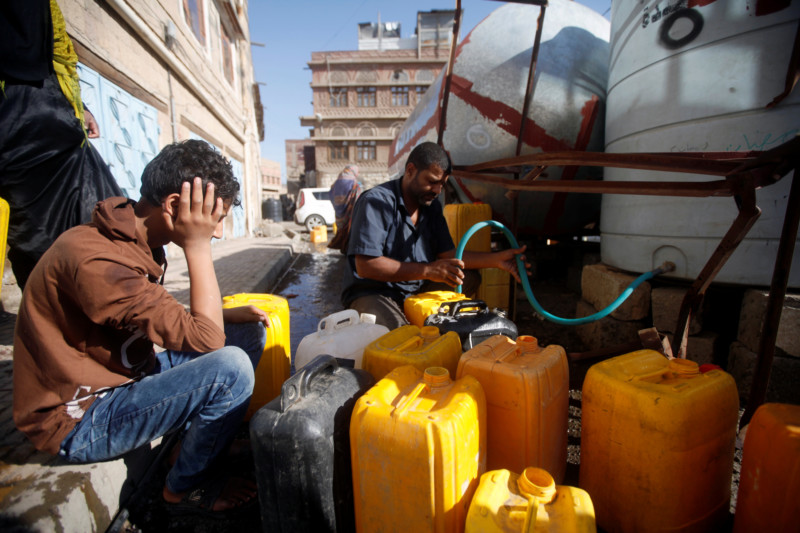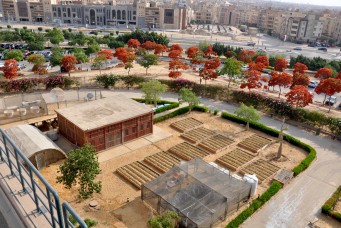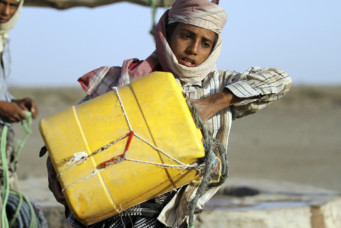The Future of Water in MENA is at Stake
The MENA region, one of the driest in the world, is facing unprecedented water management challenges due to the effects of climate change

People collect drinking water from a charity tap amid a shortage of drinking water supplies in Sanaa, Yemen, Oct. 11, 2019. Mohamed al-Sayaghi/Reuters
The Middle East and North Africa (MENA) region is one of the most water-stressed regions in the world. Global warming has exacerbated water shortages in water-poor areas, increased the risk of drought for agriculture, and increased the vulnerability of vital ecosystems. North Africa, specifically, has registered one of the lowest water rates in the world of less than 500 cubic meters per capita per annum. It is undeniable that climate change will play a massive role in the region’s choices regarding water as a resource.
Unequal distribution of water resources in a region where they are already scarce has led to their overexploitation. For example, groundwater, which is the primary water source for domestic, agricultural, and industrial uses, has been used to expand agriculture into arid or desert areas through agribusiness companies. These companies promote the use of groundwater-based agriculture for economic profit, which increases the pressure placed on these valuable water resources.
Scarcity as a result of extreme weather conditions also has a significant impact on agricultural activity in semi-arid regions, affecting crop productivity, increasing groundwater salinity in coastal areas, and causing water deficits and difficult working conditions for farmers. In the meantime, escalating climate conditions are changing and will continue to impact agriculture across the region.
One face of that new reality is the unexpected ripple effect from conflicts and wars on agriculture and global and regional food security. For example, both Russia and Ukraine combined are responsible for 30 percent of global wheat exports while countries like Egypt, Algeria, Libya, and Tunisia produce less than their population’s wheat consumption and depend on Ukraine and/or Russia for wheat imports.
The ongoing crisis has left these countries facing inflation, and many food commodities have vanished from local stores, making living conditions unbearable amid increasing poverty rates. Furthermore, decades of political instability, conflict, and higher import-to-export ratios have poorly impacted the agricultural sector’s development in the MENA region and left many food systems stagnant.
The solution? Addressing climate change is crucial in policy and management decisions related to water. Water management planning must take into account the local context of specific countries and make use of integrated policies across Arab states. It is also crucial to have the ability to forecast future challenges but also put in place mechanisms which can turn current challenges into opportunities.
However, it is worth noting that the politicization of water issues in the region has, in some cases, removed the question of water scarcity from development discussions and from the public sphere. The late Muammar Gaddafi, for example, made water a national security variable in Libya, which distanced the topic from local and public discussion. The former regime imposed a top-down vision, empowering the state to be the sole “water manager,” with the public sector controlling all resources and leaving no room for national and international stakeholders to support the development of alternative water resources that would reduce pressure on groundwater sources. The water crisis in Libya re-emerged as an issue of public debate only after the 2011 uprising unseated Gaddafi’s government.
Yet, the prevalence of corruption, lack of prioritization of the environment, and weak legislation have stemmed the pace and effectiveness of climate action across the region. Studies show that corruption obstructs anti-climate change funding efforts and initiatives, fuelling violations against the environment such as increased deforestation, illegal harvesting of minerals, and underreported overfishing.
Policy efforts to protect the environment become ripe for corruption because many developing countries in the region have weak governmental institutions that lack transparency. One example of corruption is the relationship between the ruling class in some countries and the fossil fuel lobby, which makes more allowances for oil and gas companies to exist and exercise environment-harming practices. Although laws are available to guard against these practices, the need for an environmental strategy in some countries, such as Lebanon—where corruption has held the environment hostage, and has failed to address the waste crisis and the doubling of severe pollution rates in the air—is crucial to making any progress attainable. Therefore, tackling environmental challenges in the region requires robust governance systems that can allow for the effective design and implementation of climate policies and better monitoring programs.
More than a National Security Problem: Thinking about Water Management
Looking at the water issue from a national security lens has limited the opportunities to take full potential and think about water management. In fact, water can easily be a transnational problem, as in the case of the Turkey, Syria, and Iraq conflict over the Euphrates Tigris or The Renaissance Dam in the case of Egypt, Ethiopia, and Sudan. Considering these examples, it is imperative to think about water and water management solutions from a regional lens and, in some cases, through international mediation and support. The politicization of water issues has diminished or narrowed the lens through which water is perceived.
One of these solutions includes investments in water technologies such as desalination plants in coastal areas and wastewater treatment for water reuse. This will allow for regional cooperation and integration to emerge and will therefore create more opportunities to develop solutions to water issues. For example, Egypt plans to build fourteen desalination plants through the Sovereign Fund of Egypt, in which Egypt and UAE-based firms are to invest in solar power. Studies have suggested the importance of investing in renewable energy-powered desalination plants while considering the sustainable use of renewable energies used in their operation. In addition, the Gulf Cooperation Council (GCC) countries, with the UAE and Saudi Arabia taking the lead, are reported to have the highest global water desalination capacity of 81 percent; this means that they are capable of producing around 40 percent of the world’s desalinated water, allowing them to be go-to partners with other countries that suffer from scarcity or lack water technology.
Countries in the region also need to develop the know-how to integrate water efficiency into economic reform policies in general. That means developing a unified reference framework for the water sector that includes a comprehensive and focused strategy which integrates directions, policies, legislation, and practices at the national level. This work includes stakeholder engagement and assessment of the current state of the sector across a range of issues such as water demand, water resources, and sector operations. It should identify the nature and magnitude of gaps between supply and demand and the sector’s economies under different scenarios.
Water management is a must and governments should consider ways to become more efficient. Investment in water-saving technologies in irrigation, such as drip technology or water capturing, boosts the development of supported entrepreneurship and innovation. In Morocco, for example, two hundred thousand agri-food producers and entrepreneurs were reported to have received financial incentives to transition to climate-smart agriculture techniques and practices. Governments have a role to incentivize farming to conserve water. They can also take further steps to prohibit growing water-intensive crops to help reduce water consumption for agricultural areas. One of the solutions that can be further investigated, for instance, is to provide incentive packages in both energy and water to assist farmers in adapting to changes imposed on these sectors.
Enhancing the efficiency of buildings and the overall construction sector is another way to go, although this is usually missed from development discussions around water construction. The building industry consumes high quantities of water in its daily operations; some examples of this challenge include the construction boom of residential and industrial buildings in Saudi Arabia and Egypt. Regulations must consider local contexts and the available tools before looking into other models from other regions that wouldn’t necessarily translate well once implemented.
Such green thinking is emerging in the region, especially in Jordan where wastewater treatment systems are being used for agriculture use. The As-Samra wastewater treatment plant is a successful example, and has been used in the country under the Public Private Partnership economic model. In contrast, in the Gulf region and conflict countries such as Syria, Libya, and Yemen, there is heavy dependence on groundwater, amid a growing demand for bottled water as a source of clean drinking water. Nestle SA and Agthia Group are among the major players in the GCC’s bottled water market and have succeeded in marketing bottled water to be as clean as faucet water. The implication of this perception is significant environmental damage due to plastic waste.
Water planning requires the inclusion of different sectors— and not only focus on agriculture—and must be addressed as a cross-sectoral issue requiring a holistic approach to its management. This necessitates not only global and regional partnerships, but also a long-term vision to have a return on investment that could possibly save the planet.
Malak Altaeb is an independent consultant, blogger, and researcher from Libya based in Paris, France. She is a member of the Libyan Youth Climate Movement (LYCM) member and the Groundwater Youth Network (GWYN). Her work has appeared in the North African Policy Initiative (NAPI), the Arab Reform Initiative (ARI), ISPI (Italian Institute for International Political Studies), The Policy Corner, and the Tahrir Institute for Middle East Policy (TIMEP), among others.
Read More



